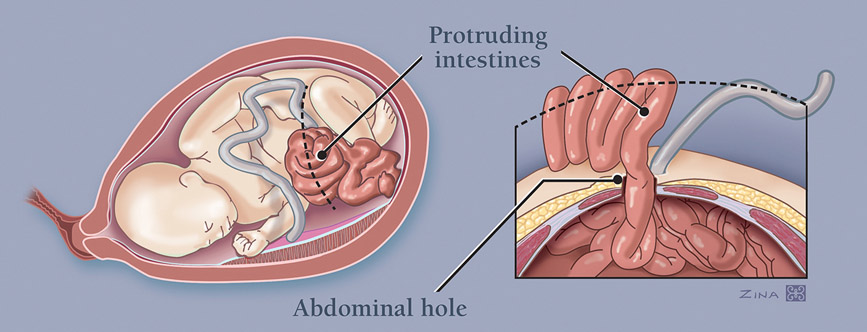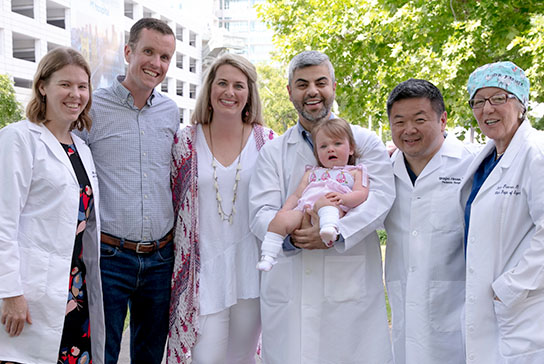Fetal Care and Treatment Center
Gastroschisis

What is gastroschisis?
Gastroschisis is a defect that consists of a hole in the abdominal wall. As a result, the intestines protrude outside of the fetus. Most of the time, the intestines and stomach are outside of the abdomen. In severe cases, other organs can be outside of the abdomen as well.
Diagnosis
Gastroschisis is typically detected during routine prenatal screening. Fetuses with gastroschisis are monitored carefully by ultrasound for slow or low growth while in the womb and for damage to the intestines. The resulting sonograms will accurately distinguish gastroschisis from similar conditions and detect whether the protruding bowel becomes dilated, develops a thick wall or loses blood flow.
Treatment
Assessment and treatment of gastroschisis before and after birth require the expertise of a specialized hospital with experience managing complex and rare fetal problems. It is also important to plan for delivery at a hospital with a neonatal intensive care unit (NICU) where the intestines can be immediately covered and kept warm and moist. Soon after birth, the baby will have surgery to return the organs to the abdomen and close the opening in the abdominal wall. Occasionally, more than one surgery is required. Most of these operations can be performed at the bedside in the NICU.
If the gastroschisis is large, a covering called a silo (a silicone sack) will be placed over the abdominal organs on the outside of the baby. Gradually, over the course of several days, the organs will be squeezed through the silo into the opening and returned to the body.
Babies with gastroschisis may stay in the hospital for several months, but most only stay for several weeks. They are discharged when they are taking all their feedings by mouth and gaining weight.
Outcomes
Fortunately, most fetuses with gastroschisis do not have severe damage to the intestine before birth. The relatively normal intestine can be returned to the abdomen, and the defect closed in one or two surgical operations shortly after birth.
Up to 20 percent of fetuses with gastroschisis will have significant damage to the intestine and can require several operations for repair. Damaged bowel may also have to be removed. Severely affected babies may not survive. Others may develop short bowel syndrome, related to improper nutrient absorption, and require nutritional support for many months.
Contact us or make a referral
Physicians, patients and families can contact the Fetal Care and Treatment Center to find out more about our fetal care services.
Wondering about what types of conditions should be referred to us? View list of conditions to refer.
Referring physicians from other facilities, please use our Fetal Care and Treatment Center Referral form to refer patients and request services.
UC Davis Children’s Hospital
4301 X Street, 1st Floor, Suite 1501
Sacramento, CA 95817
The Fetal Care and Treatment Center is located within UC Davis Children’s Hospital.
View map and directionsarrow_forward

